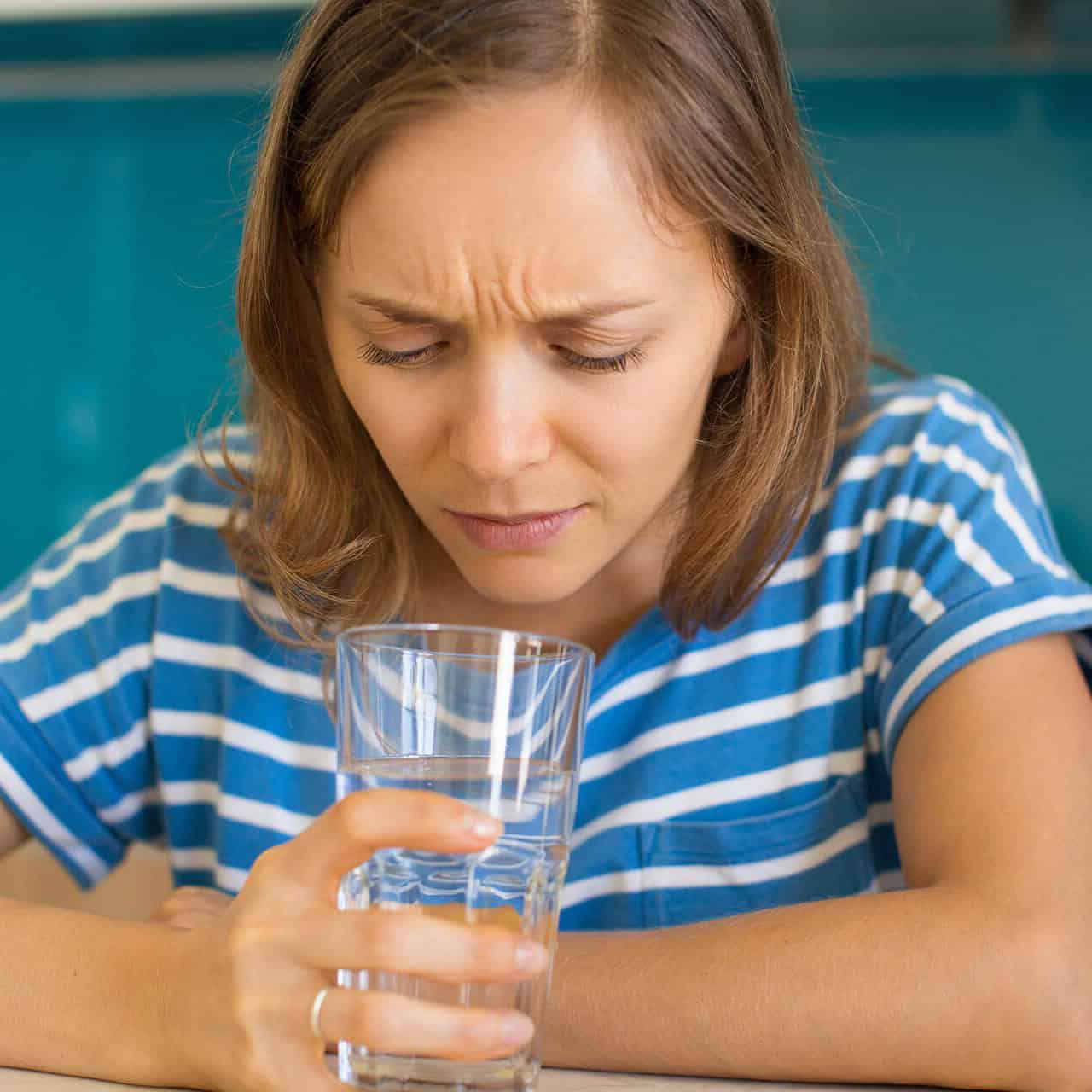Smelly Water or Bad Tasting Water
There are many things that can give water smelly odors and bad tastes.

It could be chemicals used to treat your drinking water, environmental contaminants or even concentrations of metal that have been cast off in old plumbing pipes. Some of the culprits behind smelly bad tasting drinking water could be:
- Hydrogen Sulfide, which can produce a rotten egg smell;
- Dissolved solids which cause a musty, earthy wood smell;
- Chlorine used in the municipal water treatment process;
- Metallic tastes and smells from mercury, lead, arsenic and iron seeping into the water supply.
How Do I Get Rid of the Rotten Egg Smell?
Water absorbs hydrogen sulfide as it passes through the ground. When you turn on your faucet, you actually vent the gas from your tap water, which emits that rotten egg smell. Hydrogen sulfide can be treated with oxidation and filtration. Oxidation turns the gas into elemental sulfur which can then be removed via water filtration. Normally, an aeration system injects air into the water to oxidize the gas. The water then passes through a filter that removes the sulfur. The result is water free of the rotten egg smell.
What Are Dissolved Solids in Drinking Water?
Dissolved solids, or Total Dissolved Solids (TDS), refer to any compounds left in the water after normal treatment and filtration. TDS in drinking water originate from natural sources, sewage, urban run-off, industrial wastewater, chemicals used in the water treatment process, and sometimes the plumbing system itself. TDS can make your drinking water taste bitter, salty, or metallic and may have unpleasant odors. It can interfere with the taste of your food and beverages, taste of your ice cubes and make your water less thirst quenching and your coffee taste downright nasty. We are all exposed to toxic minerals and chemicals found in the air and in our food on a daily basis. Water flushes these toxins out of our bodies. The purer the water is, the better it is at collecting and cleansing these compounds from the body. Many consumers want to purify their water for drinking, cooking and ice cubes. We can help you by installing a water treatment system that can treat your whole house, or simply the water you use for cooking, drinking or making ice cubes.
Smell and Taste Chlorine in Drinking Water
Since the mid-1800’s, chlorine has been used as a disinfectant to kill harmful bacteria in water or in the pipes that transport it, helping to eliminate a number of major threats to public health. Although chlorine in water is essential at the treatment plant and in the water distribution system, it is no longer necessary once the water reaches your home. Chlorine tastes and smells bad. It dries skin and hair, fades clothes (bleach is made of chlorine) and can dry out the rubber seals in appliances, shortening their lives. Chlorine is not good for the human body either!!! We can help you by installing a water treatment system that can treat your whole house, or simply the chlorine from the water you use for cooking, drinking or making ice cubes.
Drinking Water Has a Metallic Taste and Smell
Metals, like copper, iron, and lead found in tap water have their own unique smells and tastes. Usually copper and iron appear in low concentrations and are not harmful, although they can discolor your water. Rusty brown water is a result of high amounts of iron, and can indicate that your pipes may need to be replaced or you need an iron filtration system for your incoming water. Lead is a more serious concern, because it can be bad for your health. Lead in drinking water usually comes from plumbing that has been connected with lead solder which was outlawed in 1986, or from outdated water distribution lines. Many water pipelines in the U.S. were put in place before 1975, and aging plumbing pipes can contribute to drinking water contamination.
There are things you can do to reduce the risk of lead in your drinking water. Some sources suggest running your tap water for a couple of minutes before filling a glass to flush any accumulated lead from the water line (lead dissolves into standing water over time). This isn’t a foolproof solution, however, since there is no way of knowing whether all of the lead has been removed. Also, lead can still dissolve into running water. NOTE: When preparing drinks or meals, never use hot tap water. Hot water attracts more lead than cold water does. If you need hot water, heat cold tap water on the stove or in a microwave. You can also invest in a carbon drinking water filter or reverse osmosis system that has been certified to protect your drinking water from lead.
Not sure what to do? Z PLUMBERZ has a number of effective and affordable solutions to solve your smell water problems. We are fully licensed and insured for all of your plumbing, water, sewer and drain needs. Our technicians are clean-cut, polite, friendly, arrive on-time and are background and drug tested for your peace of mind. We operate 24 hours a day, 7 days a week and we never charge extra for nights, weekends or holidays…EVER! For all of our work you are assured of option pricing; you will know the repair options we suggest and the price of each option BEFORE we do any work. You pick and approve the option you like best, only then do we do the work.


